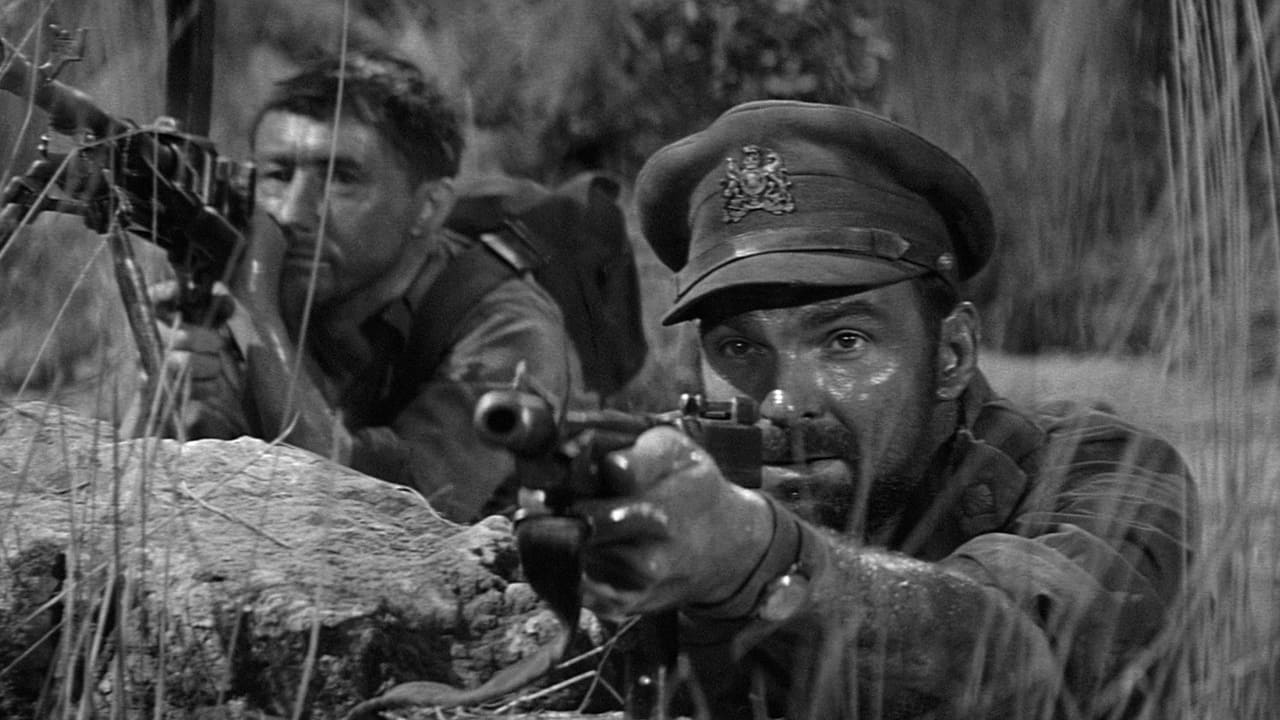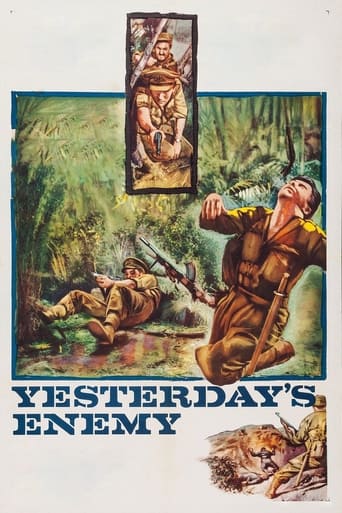

Don't Believe the Hype
... View MoreBest movie ever!
... View MoreAfter playing with our expectations, this turns out to be a very different sort of film.
... View MoreThis is a small, humorous movie in some ways, but it has a huge heart. What a nice experience.
... View MoreThis is a watchable British war film, where everyone is appropriately sweaty and greasy, but there are several details that make the film highly unrealistic. The Japanese commander is obviously Chinese. I found that annoying. The entire film had the look of being done in all studio shots; no realism at all. Baker is fine; as is the entire supporting cast. The Asian actors give it their best shot, but only the Japanese assistant is believable. I did like the depiction that the British were no more clever, ethical, or braver than the Japanese; the British always did a much better job of that than Americans ever did (with the exception of Letters From Iwo JIma). All in all, the plot was rather mundane; but did the best it could.
... View MoreYesterday's Enemy was a BBC television play by Peter R Newman. It was inspired on a war crime perpetrated by a British army captain in Burma in 1942.This is the Hammer remake. It retains Gordon Jackson who appeared in the original play. It is a low budget film. The jungle setting very much looks like a film studio and seems uninspired.In fact I had little expectation of this film in the first few opening minutes. I just looked like a typical jungle war film with the angry young men of the late 1950s. Something a bit like The long and the short and the tall.What it turns out to be is a stark morality play about ethics of warfare, The Geneva convention and fighting for the greater good.It has sense of rawness which you felt would had been controversial at the time of its release.Captain Langford (Stanley Baker) leads his lost patrol in the Burmese jungle as they retreat from the Japanese. They come upon a small village which they take from the Japanese. Langford is interested in man who attempts to flee who he thinks might know about a map with strange markings they have found on a high ranking dead officer.Langford all sorts of threats and intimidation tactics which become more severe. The padre and the journalist attached with the patrol protest at his brutal methods. Langford has none of it, he even plans to move on with his patrol and leave the injured men behind as they would slow him down.At the end he guns down two innocent villagers in order to make the detained man talk. He also has him killed in due course.Eventually the group are later overwhelmed by the Japanese. They are now interrogated by Major Yamazaki who speaks good English. He is very courteous but his menace is more indirect compared to Langford but just as brutal. In short the Major adopt similar methods to get answers about their missing high ranking officer.There is no doubt that this is a provocative film showing the cruelty of British officers. Yet Baker gives such a stoic performance, his Captain Langford despite his shortcomings and brutality is just the kind of man who could lead the able men in his patrol to safety.
... View More"When You Go home, Tell Them Of Us And Say, For Your Tomorrow, We Gave Our Today"There's a school of thought in film world that all war films are anti-war films, some, however, are the definition of such and are cream of the crop. Yesterday's Enemy is one such picture.Out of Hammer Films, it's directed by Val Guest and written by Peter R. Newman. It stars Stanley Baker, Gordon Jackson, Guy Rolfe, Leo McKern and Philip Ahn. Story has the surviving members of a British Army Brigade holing up in a Burmese jungle village, where Captain Langford (Baker) happens upon a map that could prove critical to operations involving the Japanese forces in the area. Unable to get clarity from a potential traitor, Langford must make decisions that will outrage those in his quarters, but could well be for the greater good of the war effort. All while the Japanese are advancing on the village.There is no music here, this is purely a sweaty black and white piece that booms with literary class. These men caught in a claustrophobic crossfire of moral quandaries, faiths and life altering judgements. Complex issues are brilliantly handled by Guest and his superb cast, with ace cinematographer Arthur Grant (shooting in MegaScope) completely making a mockery of the stage bound production to make real a Burmese jungle village. Come the sobering finale the realisation dawns that this was a bold movie for its time, pushing the boundaries of 1950s war movies. It's a must see film for anyone interested in the real side of that famous saying, war is indeed hell. 9/10
... View MoreThis film was made right in the middle of a period when cinematic interest in the Far East war was at its height.The big film of 1958 was The Bridge On The River Kwai.Also that year Guest directed for Hammer The Camp On Blood Island.In 1960 the film of the successful play The Long and The Short And The Tall was released.I recall that there was a storm of protest from veterans of the Burma campaign,as they claimed that civilians were not killed and mistreated.Baker gives a powerful performance as an officer under pressure.He was on his way up to stardom.The same year he would star in another Guest film,Hell Is a City,this time starring as an unconventional detective. One does have the suspicion that this film was made rather on the coattails of Kwai and The Long and the Short and The Tall.Elements from the plot of that film are in this film.Furthermore in both films the platoon ends up being killed by the Japanese.Although now released on video this film is pretty much unknown.Despite a clearly limited budget this film is effective at evoking the jungle and the tough decisions that Baker has to make and not least the ironical situation he finds himself in.
... View More